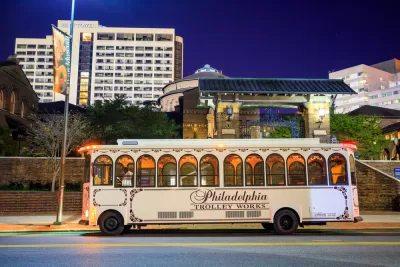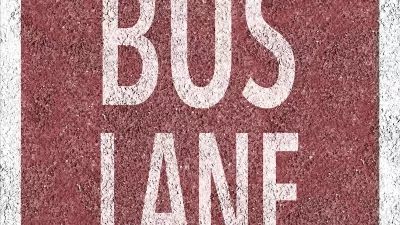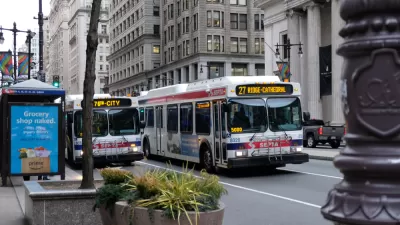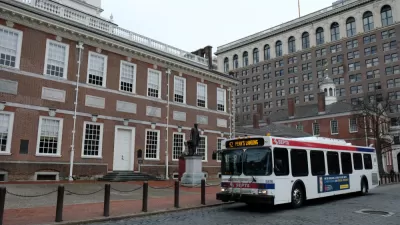The plan, which looks more than two decades into the future, seeks to modernize the city's transit system, address inequities, and improve regional connectivity.

Philadelphia officials unveiled an ambitious 24-year plan for the city's transit system that "aims to improve the system while addressing long-standing racial inequities through a redesigned bus network and Regional Rail service, modernized trolleys, and increased accessibility across the system." The plan, reports Darryl C. Murphy for WHYY, includes both current projects and "aspirational" but as-yet-unfunded ideas.
Philadelphia Deputy Managing Director for Transportation Michael Carroll said the plan "will help the city and [the Southeastern Pennsylvania Transportation Authority] compete for federal grants and align projects in a challenging post-pandemic economic landscape" while addressing the legacy of historical inequities in the city's transportation policies. "For instance, residents of color face commutes that are on average 12 minutes longer than white residents," and low-income commuters spend more on transit "because of transfer fees and connectivity challenges in neighborhoods outside of the city’s downtown core," writes Murphy. A restructured fare plan introduced by SEPTA last year seeks to address these issues and make the system more affordable.
"The plan unveiled Monday includes 30 corridors for improvements such as bus lanes, transit priority signals, and boarding islands to speed up bus service as options" and highlights the importance of Regional Rail. "This isn’t just about connecting suburban commuters downtown. More than 40% of Philadelphians work outside of the city," says City Councilmember Cherelle Parker in the article. The plan, which involved collaboration from multiple agencies and community groups, could signal a new level of regional cooperation.
FULL STORY: Faster buses, more Regional Rail, modern trolleys: Philly’s transit plan takes system to 2045

Study: Maui’s Plan to Convert Vacation Rentals to Long-Term Housing Could Cause Nearly $1 Billion Economic Loss
The plan would reduce visitor accommodation by 25,% resulting in 1,900 jobs lost.

North Texas Transit Leaders Tout Benefits of TOD for Growing Region
At a summit focused on transit-oriented development, policymakers discussed how North Texas’ expanded light rail system can serve as a tool for economic growth.

Using Old Oil and Gas Wells for Green Energy Storage
Penn State researchers have found that repurposing abandoned oil and gas wells for geothermal-assisted compressed-air energy storage can boost efficiency, reduce environmental risks, and support clean energy and job transitions.

Private Donations Propel Early Restoration of Palisades Playground
Los Angeles has secured over $1.3 million in private funding to restore the Pacific Palisades playground months ahead of schedule, creating a modern, accessible space that supports community healing after recent wildfires.

From Blight to Benefit: Early Results From California’s Equitable Cleanup Program
The Equitable Community Revitalization Grant (ECRG) program is reshaping brownfield redevelopment by prioritizing projects in low-income and environmental justice communities, emphasizing equity, transparency, and community benefits.

Planting Relief: Tackling Las Vegas Heat One Tree at a Time
Nevada Plants, a Las Vegas-based nonprofit, is combating the city’s extreme urban heat by giving away trees to residents in underserved neighborhoods, promoting shade, sustainability, and community health.
Urban Design for Planners 1: Software Tools
This six-course series explores essential urban design concepts using open source software and equips planners with the tools they need to participate fully in the urban design process.
Planning for Universal Design
Learn the tools for implementing Universal Design in planning regulations.
Ascent Environmental
Borough of Carlisle
Institute for Housing and Urban Development Studies (IHS)
City of Grandview
Harvard GSD Executive Education
Toledo-Lucas County Plan Commissions
Salt Lake City
NYU Wagner Graduate School of Public Service





























